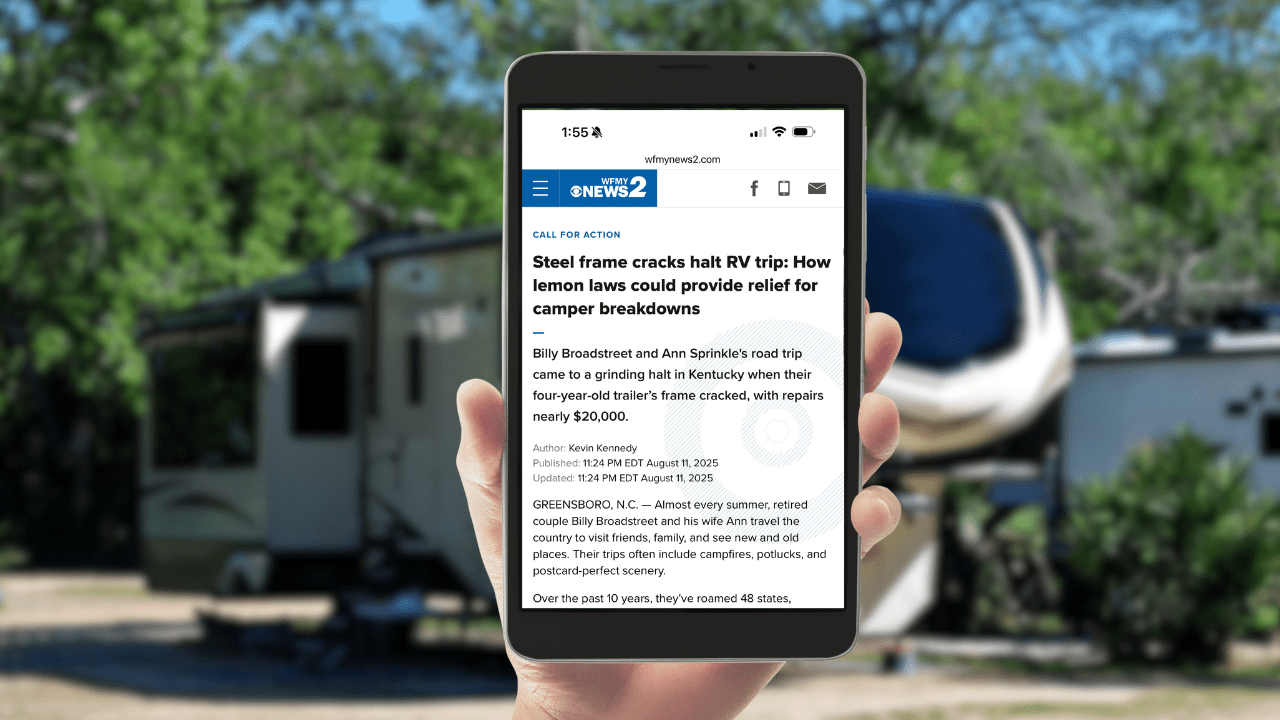Billy Broadstreet and Ann Sprinkle of Greensboro, North Carolina, had spent a decade crisscrossing the country in their fifth-wheel RV. Their summers were marked by campfires, potlucks, and friendships made from Canada to Texas. They had logged miles in 48 states, enjoying the open road as a cherished part of their retirement.
But during a recent trip through Kentucky, their annual tradition came to a sudden stop. What should have been another postcard memory became a test of safety, finances, and persistence.
The Nightmare
While towing, Billy felt something was off.
“It’s not pulling right,” he told Ann. The trailer didn’t respond the way it normally did, though he couldn’t identify exactly what was wrong. Trusting his instincts, he pulled over. That decision may have prevented disaster.
At the repair shop, mechanics discovered multiple cracks in the steel frame. Pieces of the substructure fell to the concrete when sections were removed. If the Broadstreets had kept going, the trailer might have separated from the truck entirely.
The RV was only four years old, but no longer under warranty. The repair bill approached $20,000, which was far more than the couple could afford. Their trailer sat at the Kentucky shop for months as they contacted the dealer, the manufacturer, and the frame builder. Calls and emails went unanswered.
Turning to Advocacy
With no progress, Billy suggested contacting WFMY News 2, a CBS affiliate in Greensboro known for its consumer-advocacy team, “2 Wants to Know.” The station reached out directly to the dealership, manufacturer, and frame company.
That changed everything. Within months, the Broadstreets’ trailer was repaired at no cost to them.
“It was a blessing,” Ann said. “I don’t know what you said, but you got it going – we’re grateful.”
Today, they’re back on the road, sharing photos from their travels once again.
(Source: WFMY News 2)
Lessons for RV Owners
I really wish they had revealed the make and model of the Broadstreet’s RV. Perhaps there was some sort of non-disclosure agreement as part of the deal to cover the repairs.
Regardless, the Broadstreets’ experience highlights several steps every RVer can take if they face structural or warranty issues.
- Listen to Your Instincts – Billy’s sense that something wasn’t right led him to pull over. Acting quickly can prevent further damage or worse.
- Document Thoroughly – Take photos and videos from multiple angles. Note when and where the issue appeared, and describe any symptoms like pulling, vibration, or noises while towing.
- Contact Dealers and Manufacturers – Report the problem in writing. Ask for inspection or repair authorization and keep a record of all correspondence.
- Escalate if Necessary
- File a complaint with NHTSA. Multiple reports can trigger investigations if a defect is widespread.
- Seek legal guidance. Some attorneys specialize in RV lemon law and warranty disputes.
- Look for advocates. Consumer protection teams, advocacy groups, and RV community leaders can bring attention to unresolved cases.
- Reach out to local media. As the Broadstreets’ case shows, a consumer-advocacy newsroom can sometimes get results. Liz Amazing is another advocate for RV owners who has helped multiple owners in a similar situation.
Lemon Laws and RVs: What to Know
Lemon law protections are not consistent across the country, and many RV owners are surprised at how limited they can be. Unlike cars and trucks, towable RVs such as travel trailers and fifth wheels are often excluded from state lemon law coverage..
State Coverage Varies
- Motorhomes vs. Towables: Most states apply lemon laws to self-propelled vehicles (motorhomes, cars, trucks). Towable RVs are commonly excluded.
- States with Broader Protection: A few states, including Texas and Connecticut, specifically extend coverage to towable RVs. Texas law, for example, allows claims if an RV is out of service for more than 30 days in the first 24 months or 24,000 miles.
- Florida Example: Florida’s law covers the chassis and drive components of RVs for 24 months, but not the “living quarters” (appliances, plumbing, cabinetry, etc.).
Federal Warranty Protections
If state lemon laws don’t apply, the Magnuson-Moss Warranty Act may still provide a legal path. This federal law lets consumers pursue claims when a manufacturer fails to honor its warranty obligations, even on towable RVs.
Common Limitations
- New Purchases Only: Most state lemon laws apply only to new RVs, not used ones.
- Repair Attempts Rule: Typically, the law requires a “reasonable number of repair attempts” (often three or four) or 30+ cumulative days in the shop before a buyback or replacement may be ordered.
- Arbitration: Some states require arbitration with the manufacturer before filing a lemon law claim.
Practical Steps for RV Owners
- Seek Legal Help: If the manufacturer refuses to address a warranty issue, consult a lawyer familiar with RV and consumer warranty law.
- Document Everything: Keep repair orders, correspondence, and records of how long your RV has been out of service.
- Notify in Writing: Send written notice of defects to the manufacturer or dealer.
- Check Your State Law: Review your attorney general’s website or state lemon law statute for details.
Have you faced a similar situation? Tell us about it in the comments







Write a comment